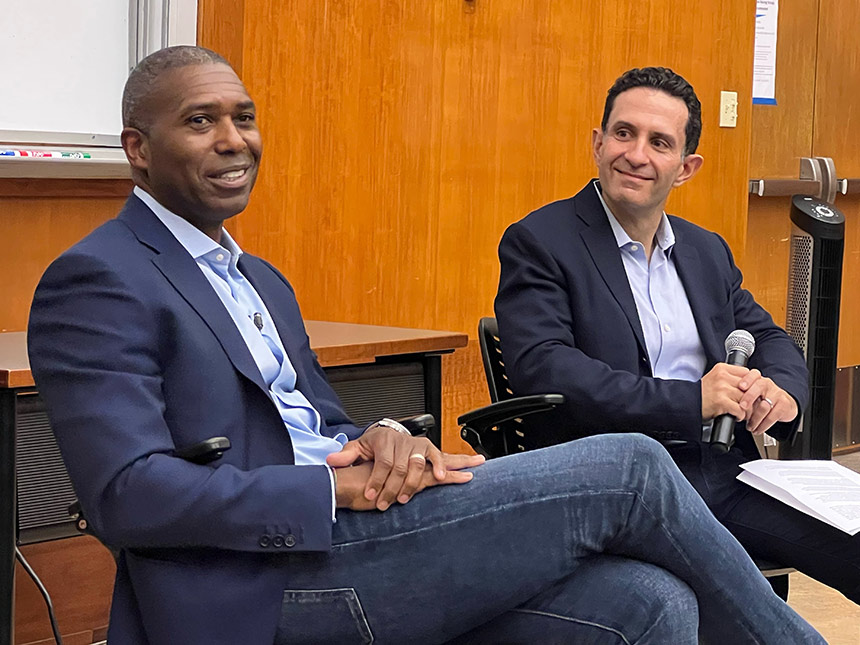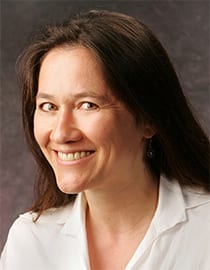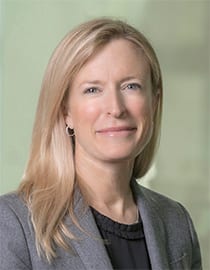
By Andrew Cohen
As the spring semester gets underway, students are taking part in a massive slate of new courses at Berkeley Law — 18 in all. The school’s top-ranked business law program is a prime example of this innovation and reach, with three such courses tackling hot-button topics that have become increasingly vital in legal practice.
Sustainable Corporate Governance Colloquium, a two-unit course taught by Professor Stavros Gadinis, dives into the sustainability and ESG (environmental, social, and governance) issues that have swept the corporate space by storm. “In a world of huge technological advances, ongoing business disruption, mounting fears of climate change, and increasing inequality, it is becoming clear that any solution must include corporate action,” Gadinis says. “But what exactly is the role of corporations in this puzzle?”
As firms set up new practice groups, regulators pass new requirements, and foreign jurisdictions increase their demands, leading scholars in the field will present their work on these issues and surface different viewpoints for students to discuss. While activists worry about “greenwashing” — where companies are big on talk but short on action — more conservative observers fear that a biased elite has taken over the C-suite and needs to be reined in.
Exploring what role corporations can and should play, students will study how they interact with other actors in these spheres and the tools needed to achieve sustainability benchmarks. They will also learn how such tools include ways to better achieve transparency, accountability, and standard-setting, and to help companies credibly commit to goals and communicate with investors, local authorities, federal agencies, and other parties.
FinTech Innovation and Financial Inclusion, a one-unit course taught by Upgrade Deputy General Counsel Tuong-Vi Faber, explores how FinTech — which uses technologies to reshape how financial products and services are structured, provisioned, and consumed — is disrupting the traditional financial sector and providing new opportunities and challenges for financial inclusion.
Recent studies indicate that close to one-third of the world’s adults are excluded from traditional financial services, roughly 20% of Americans are either unbanked or underbanked, and nearly 40% of U.S. of households are liquid asset poor, meaning they lack enough savings to cover basic expenses for three months if they experienced an income shock.
The course addresses the limitations of the traditional financial sector, whether FinTech is living up to its promise, its U.S. legal and regulatory environment, and key areas of innovation. Expert guest speakers will help students explore the interplay between innovation, consumer protection, and financial inclusion, and evaluate whether FinTech is reducing or reinforcing inequalities.
Communication Skills for Business Lawyers, a one-unit course taught by Amazon Senior Business Affairs Executive Paul Marchegiani, is an interactive workshop that explores the performance and oral communication skills necessary for business lawyers to meaningfully connect with clients, negotiate deals, and speak in public with confidence and conviction.
Through a series of active group exercises and games, performance theory discussions, and individual assignments, students learn how to tap into their unique voice to authentically engage others and better represent clients.
The course aims to bolster skills needed for competent and ethical participation as a member of the legal profession, such as interviewing, counseling, negotiation, public speaking, advocacy, and client service. It also seeks to enable students to speak and move with more freedom and presence, and to connect with audiences of all sizes and backgrounds.
“Berkeley Law remains a national leader in business law, not only because of the pathbreaking scholarship of our professors, but also their innovations in the classroom,” says Professor Andrew Bradt, the school’s associate dean of J.D. curriculum and teaching. “The array of opportunities offered to our students from this extraordinary group of instructors, which includes both preeminent scholars and thought leaders in the profession, is unparalleled.”
Here are other courses being taught at Berkeley Law for the first time this semester:

Angel Island – Legal Histories of Imprisonment: Taught by Professor Leti Volpp, this one-unit course probes the history of Angel Island’s immigration detention center and its connections to carceral regimes today. Meant to accompany the campus-wide project “A Year on Angel Island,” the course includes lectures, excerpts of “The Chinese Exclusion Act” documentary, and interactions with Angel Island historians about immigration exclusion, detention, and imprisonment.
Anti-Discrimination Policies in Insurance Law: Taught by University of Iowa Law Professor Anya Prince, this one-unit course explores the tensions between the social and actuarial concepts of fairness that undergird anti-discrimination rules in insurance. Starting with an overview of key insurance principles and regulatory systems, it addresses current debates among regulators, including the use of credit scores, genetic test results, and algorithms in insurance underwriting.
Asylum Law Seminar and Practicum: Taught by Kyra Lilien, director of the Immigration Legal Services program at Jewish Family & Community Services East Bay, this three-unit combined course enables students to represent an Afghan family before the U.S. government while receiving classroom guidance and support. Students learn about the origins and elements of U.S. asylum eligibility, and work in pairs to prepare their client’s asylum application.
Designing Government Services: Taught by design researcher and strategist Nikki Zeichner, this one-unit course teaches students key human-centered design methods, how to apply them to understand public services from a new angle, and how such design influences advocacy, legal services, and policy making. The course shows how for those who rely on government services, poor design is often more than an inconvenience; it creates a barrier to accessing benefits.
Human Rights Practice Workshop: Taught by Clinical Professors Laurel E. Fletcher and Roxanna Altholz ’99, this two-unit course explores the role of todays’ human rights lawyers in a range of institutional settings as the human rights movement faces increasing repression worldwide. Students learn about relevant mechanisms and how to think critically about the promise and limitations of mobilizing human rights norms, strategies, and institutions.

Introduction to Supreme Court for 1Ls: Taught by Professor Amanda Tyler, this one-unit reading group on the Supreme Court gives first-year students an introduction into how the Court functions, its current cases, and the debates surrounding its potential reform. Students read scholarship and commentary about the Court as well as pending cases, and engage in written exercises that mimic what real Supreme Court law clerks undertake.
Litigating Class Actions: Taught by Civil Research Justice Initiative Executive Director Anne Bloom and Impact Fund Executive Director Jocelyn Larkin, this one-unit course provides an introduction to litigating class actions litigation and considers how they fit into the larger procedural system. The material deals with issues that have been subjects of judicial and political controversy in Congress and state legislatures, in the Supreme Court, and in the federal rulemaking process.
Pathways to Carbon Neutrality: Taught by Lecturer Fan Dai, Professor Daniel Farber, and Lecturer Robert Infelise, this two-unit course scrutinizes the policy and legal challenges facing plans to avoid severe harm from climate change by achieving carbon neutrality by mid-century. The instructors and outside speakers will address the economic and technological unknowns confronting these plans, as well as strategies and innovation for overcoming them.
Preparing to Practice Patent Law: Taught by Professor Peter S. Menell and Lecturer Allison Schmitt ’15, this two-unit course helps first-year students with a STEM background prepare to work in patent law practice next summer. The seminar combines deep coverage of several patent law topics, discussion of the different types of patent law practice, and practical information about making the most of patent-focused summer associate programs.

Special Topics in Education Policy: Race, Gender, and Sexuality: Taught by Lecturer Cameron D. Clark, this one-unit course probes the growing school politicization of public education, surveying state and local efforts to reshape the system. Students will engage with legislative and administrative materials, supplemented by case law, and examine the role race and gender does, could, and should play in developing society’s youngest minds.
Strategy: Theory, Law and Policy: Taught by Professor John Yoo, this two-unit course introduces students to the theory and practice of strategy. It begins by examining the development of grand strategy in international politics and law, then explores the application of strategy in legal, political, and business contexts. Some class meetings will welcome guest speakers to discuss the practical use of strategy in their respective fields.
The Killing of Jamal Khashoggi and the Search for Justice: Taught by Human Rights Center Executive Director Alexa Koenig ’13 and University of Wyoming Law Professor Noah Novogrodsky, this one-unit course confronts the 2018 killing of journalist Jamal Khashoggi in the Saudi consulate in Istanbul and efforts to hold his assassins accountable. Students will study legal authoritarianism, diplomacy, and how to seek justice across multiple jurisdictions and bodies of law.
The Legacy of Ruth Bader Ginsburg: Taught by Tyler, this one-unit course offers an overview of the law of gender equality in the U.S., from before the Supreme Court recognized heightened scrutiny for gender discrimination through current litigation battles. It begins with examining Ginsburg’s role in changing the relevant legal landscape with respect to gender discrimination and the law, and tracks that field of law from before the 1970s through today’s hot topics.
Thirteen Ways of Looking at a Case: Taught by Professor Seth Davis, this two-unit course introduces students to major schools of legal theory and applies them to canonical cases from the core law school curriculum. Each class session examines a new approach via close reading of a case from constitutional law, contracts, property, torts, and other core classes, offering students an introduction to legal thought and various ways of understanding and critiquing case law.
Women’s Leadership in the Law: Taught by Professor Saira Mohamed, this one-unit course studies paths toward leadership for women in the legal profession, and the challenges that women lawyers face in reaching such positions. Readings cover myriad subjects related to such leadership in various legal arenas, with class meetings featuring guest speakers who are prominent in their respective fields of the law and as candid discussion among class members.